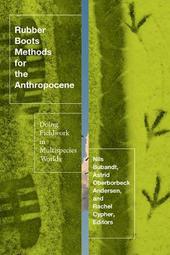
|
Rubber Boots Methods for the Anthropocene: Doing Fieldwork in Multispecies Worlds
Paperback / softback
Main Details
| Title |
Rubber Boots Methods for the Anthropocene: Doing Fieldwork in Multispecies Worlds
|
| Authors and Contributors |
Edited by Astrid Oberborbeck Andersen
|
|
Edited by Nils Bubandt
|
|
Edited by Rachel Cypher
|
| Physical Properties |
| Format:Paperback / softback | | Pages:456 | | Dimensions(mm): Height 229,Width 152 |
|
| Category/Genre | Impact of science and technology on society
Social impact of environmental issues |
|---|
| ISBN/Barcode |
9781517911652
|
| Classifications | Dewey:304.20721 |
|---|
| Audience | | Postgraduate, Research & Scholarly | | Professional & Vocational | |
|---|
| Illustrations |
57 black and white illustrations
|
|
Publishing Details |
| Publisher |
University of Minnesota Press
|
| Imprint |
University of Minnesota Press
|
| NZ Release Date |
13 June 2023 |
| Publication Country |
United States
|
Description
A methodological follow-up to Arts of Living on a Damaged Planet The environmental and climatic crises of our time are fundamentally multispecies crises. And the Anthropocene, a time of "human-made" disruptions on a planetary scale, is a disruption of the fabric of life as a whole. The contributors to Rubber Boots Methods for the Anthropocene argue that understanding the multispecies nature of these disruptions requires multispecies methods. Answering methodological challenges posed by the Anthropocene, Rubber Boots Methods for the Anthropocene retools the empirical study of the socioecological chaos of the contemporary moment across the arts, human science, and natural science. Based on critical landscape history, multispecies curiosity, and collaboration across disciplines and knowledge systems, the volume presents thirteen transdisciplinary accounts of practical methodological experimentation, highlighting diverse settings ranging from the High Arctic to the deserts of southern Africa and from the pampas of Argentina to the coral reefs of the Western Pacific, always insisting on the importance of firsthand, "rubber boots" immersion in the field. The methodological companion to Arts of Living on a Damaged Planet: Ghosts and Monsters of the Anthropocene (Minnesota, 2017), this collection puts forth empirical studies of the multispecies messiness of contemporary life that investigate some of the critical questions of our time. Contributors: Filippo Bertoni, Museum fur Naturkunde, Berlin; Harshavardhan Bhat, U of Westminster; Nathalia Brichet, U of Copenhagen; Janne Flora, Aarhus U, Denmark; Natalie Forssman, U of British Columbia; Peter Funch, Aarhus U; Kirsten Hastrup, U of Copenhagen; Colin Hoag, Smith College; Joseph Klein, U of California, Santa Cruz; Andrew S. Mathews, U of California, Santa Cruz; Daniel Munster, U of Oslo; Ursula Munster, U of Oslo; Jon Rasmus Nyquist, U of Oslo; Katy Overstreet, U of Copenhagen; Pierre du Plessis, U of Oslo; Meredith Root-Bernstein; Heather Anne Swanson, Aarhus U; Anna Lowenhaupt Tsing, U of California, Santa Cruz; Stine Vestbo.
Author Biography
Nils Bubandt is professor of anthropology at Aarhus University in Denmark. He is author of The Empty Seashell: Witchcraft and Doubt on an Indonesian Island and coeditor of Arts of Living on a Damaged Planet (Minnesota, 2017) and Philosophy on Fieldwork: Case Studies in Anthropological Analysis. Astrid Oberborbeck Andersen is associate professor of techno-anthropology at Aalborg University, Denmark. She is coeditor of Anthropology Inside Out: Fieldworkers Taking Note. Rachel Cypher received her PhD in Anthropology at the University of California, Santa Cruz, and was a teaching fellow there.
Reviews"From snorkel fins to worn sneakers, drip torches, boats, dogsleds, and the hooves of a horse, Rubber Boots Methods for the Anthropocene is a bold essay collection that pays attention to the ambulatory prosthetics that we wear or carry into particular fields (ocean, forest, savannah, university) and their many histories-material, colonial, multispecies. Situated knowledge has found its footing."-Melody Jue, author of Wild Blue Media: Thinking Through Seawater
|